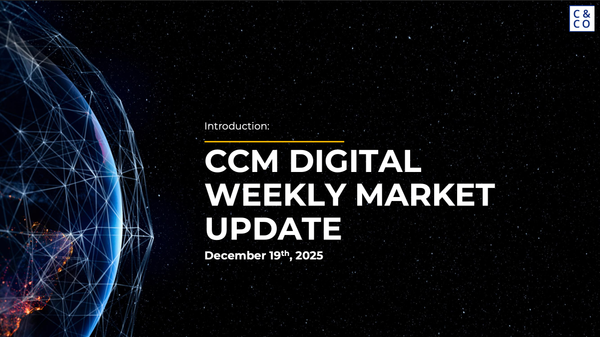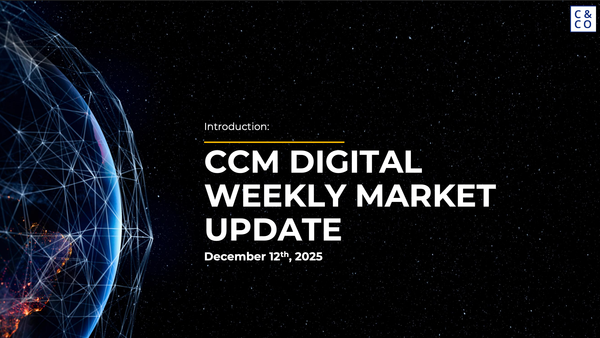CCM Blockchain Newsletter (May 12, 2025)
Trade talks quelled markets last week, and bitcoin ripped above $100,000 for this first time since January.

Happy Monday everyone, and welcome back to this week’s market newsletter. Please see below this week’s market data.
Bitcoin Market Update and News
- Bitcoin breaks above $100,000: Bitcoin shot above $100,000 last week for the first time since January 30, reaching as high as $104,500 on Saturday. At the time of publication, bitcoin is up 8% to $102,000.
- Kindly MD, Nakamoto Holdings to merge to create bitcoin strategy company: A new bitcoin strategy company is coming out of the woodwork with $710 million in funding. Kindly MD has entered into an agreement to merge with Nakamoto Holdings to mimic the Strategy playbook and form a bitcoin treasury company. At the time of writing, Kindly MD is up 330% on the news. The holding company, Nakamoto, has raised $510 million in PIPE funding and $200 million in convertible notes financing, the largest fundraising to date for a pre-launch bitcoin treasury company and the largest PIPE raise of any public crypto company. The PIPE financing pooled capital from over 200 individuals and firms, including ACTAI Ventures, Arrington Capital, Balaji Srinivasan, Eric Semler, and Jihan Wu. David Bailey, the CEO of Bitcoin Magazine and Bitcoin Conference company UTXO Inc., founded and will lead Nakamoto as CEO.
- DeFi Pioneer’s Superstate To Bring Public Equities To Solana: Equities are coming to the Solana blockchain. Compound Finance Founder Robert Leshner is now leading Superstate, a Solana startup that wants to roll out public equities on the blockchain. The company’s first product, USTB, is backed by short-term Treasury bonds, yields roughly 4.1%, and has $651 million in assets. The new offering will give investors 24/7 trading of U.S. equities, pending SEC approval.
- Companies port bitcoin treasury strategy to Solana: A handful of companies are hoping to replicate the magic of bitcoin treasury play with the asset that underpins one of the most popular smart contract blockchains, Solana (SOL). DeFi Development Corp (DFDV, formerly Janover Inc.) currently holds 595,988 SOL, while Upexi Inc. (UPXI) holds 201,500. Unlike bitcoin which has no native staking option, these companies can stake their SOL to earn yield on their holdings.
Interesting Reads and Videos
- The US Government Vs Bitcoin
- Inside UTXO Management: Tyler Evans on Bitcoin, Corporates, and the Future of Treasury Strategy
- Bitcoin back above $100,000: Financial planning icon Ric Edelman reacts to the crypto ETF boom
- What hyperscalers really want from bitcoin miners
Bitcoin Mining Market News and Trends
- Antalpha eyes $300 million valuation as it launches IPO roadshow: Bitmain’s chief financing partner, Antalpha, is hitting road to sell investors on its upcoming Nasdaq IPO, and based on its targeted share price between $11-13, the company is seeking a valuation ranging from $254-300 million. Antalpha generated $47.5 million in revenue last year, with 77% of its clients coming from Asia versus 7% in the Americas. Tether recently came out as an anchor investor for the IPO with a $25 million investment.
- Bitfarms halts hashrate expansion to focus on AI/HPC: Bitfarms is joining the throng of publicly traded bitcoin miners who are pausing their bitcoin mining expansions to build out AI/HPC business lines. The company recently announced that it won’t be purchasing any ASIC miners in 2025 and 2026 as it focuses on outfitting its Panther Creek site, purchased with its buyout of Stronghold Digital this year, for HPC load. “Our Bitcoin business is strong, and we remain bullish on mining economics with our newly upgraded mining fleet. We have no need nor plans for a large miner purchase in 2025 or 2026, enabling us to focus our efforts on developing U.S. energy and HPC infrastructure, which we believe will create lasting shareholder value,” CEO Ben Gagnon said.
- Digital Energy Council pushes to have ASIC miners exempt from Trump tariffs: The Digital Energy Council, a lobbying association focused on energy, data centers, and bitcoin mining, has submitted a comment to the U.S. Department of Commerce requesting that the Trump administration exempt ASIC bitcoin miners from tariffs. The Trump administration recently announced that it would exempt computers, such as laptops, smart phones, semiconductors, and other computing equipment, from its tariff schedule, but ASIC miners fall under a different category in the duties code. “The strategic relevance of this sector is already recognized through initiatives such as the Commerce Department’s Investment Accelerator, launched on March 31, 2025. This program is designed to assist Bitcoin mining companies in navigating regulatory hurdles and streamlining permitting processes. As Secretary Lutnick stated, ‘We’re going to make it so that if you want to mine Bitcoin and you find the right place to do it, you can build your own power plant next to it.’ Explicitly exempting ASICs from any tariffs or trade restrictions would further this important objective,” the letter reads.
Market Overview
- Stocks chop, take a reprieve from volatility: The U.S. stock market closed marginally in the red last week after mostly sideways price. Small caps outperformed large caps, with the Russell 2000 barely eking out a gain on the week.
- S&P 500: $5,659.91 (-0.5%)
- Dow: $41,249.38 (-0.2%)
- Nasdaq: $17,928.92 (-0.3%)
- Russell 2000: 2,023.07 (+0.1%)
- S&P 500 earnings continue to exceed expectations: With 90% of S&P 500 companies having reported Q1 earnings, growth rates continue to trend upward, exceeding analyst forecasts. FactSet’s latest Earnings Insight report upped its blended earnings growth rate to 13.4% from 12.8% from the last read. 78% of reporting companies have booked above-estimated earnings per share, which is greater than both the 5-year average (77%) and 10-year average (73%). Information Technology (17.4%), Utilities (13.7%), and Healthcare (8.8%) continue to lead earnings growth rate performance, while Energy (-12.7%) and Industrials (-0.7%) are the biggest laggards for earnings growth. Analysts project earnings growth rates of 5.2% for Q2 2025, 7.4% for Q3 2025, and 6.7% for Q4 2025, leading to an anticipated 9.3% growth for the entire calendar year.
- Oil rebounds: WTI Crude and Brent Crude both rallied last week, bouncing off 8% declines the week prior. WTI closed up 4.75% at $61.06/barrel while Brent closed up 4.23% at $63.88/barrel. OPEC still plans to increase output by 411,000 barrels per day in June, but U.S.'s easing trade tensions with China and the U.K. offset this forecasted increase in supply.
- Trade negotiations calm market jitters: The U.S. is going to the negotiating table with key trade partners, and early signs of success are placating markets. The Trump and Starmer administrations struck trade deals that would neutralize duties on key agricultural products, namely beef and ethanol, while the U.S. plans to lower auto tariffs on U.K. cars from 27.5% to 10% and may exempt U.K. aerospace imports from tariffs. U.S. and Chinese officials convened in Geneva, Switzerland and agreed to a 90-day pause on their aggressive tariff policies; the U.S. will lower tariffs on Chinese goods from 145% to 30%, and China will lower its own import duties on U.S. goods from 125% to 10%. Newly elected Prime Minister of Canada Mark Carney also met with President Trump to discuss a trade deal, although nothing has materialized yet. Vice President J.D. Vance and Indian Prime Minister Narendra Modi met to discuss a bilateral deal, and preliminary discussions are also underway with officials from Japan and South Korea.
- Ford’s Q1 profit plummets 64% as it suspends 2025 outlook: Ford took a 64% hit to its profit last quarter and suspended its forward guidance for 2025, citing an estimated $1.5 billion shock from the Trump Administration’s tariff policies. Ford assembles 80% of its vehicles in the U.S. but sources raw materials from other countries, and it plans to increase the prices of its Mustang Mach-E, Bronco Sport, and Maverick by $2,000. GM forecasts that tariffs will cost the company $4-5 billion as it eyes expanding its manufacturing capacity in the United States, and Toyota has provided forward guidance that anticipates a $1.3 billion headwind from tariffs that may impact its profits by 35% for the 2025 fiscal year.
- U.S. services sector wanes in April: The S&P U.S. Services Purchasing Managers Index declined to 50.8 in April. This is still above the level of expansion (50), but only barely, as trade policies weigh on business outlooks. Conversely, the Institute for Supply Management’s Services Purchasing Managers Index rose for the tenth month in a row to 51.6 in April from 50.8 in March. The service sector accounts for nearly three quarters of the U.S. economy.
- Fed keeps rates unchanged amid uncertainty, makes largest daily bond purchase since 2021: The Federal Reserve held interest rates steady at 4.25-4.5% after last week's policy meeting, citing tariff uncertainty and dual risks for inflation and increased unemployment. "We’ve judged that the risk to higher inflation and unemployment has risen,” Fed Chair Jerome Powell said in the press conference. On May 5, the Federal Reserve purchased $20 billion of 3-year notes, the largest one-day purchase since 2021.
- Job growth halves in April: The ADP National Employment Report for April clocked 62,000 private sector jobs added last month, a significant decline from March’s revised 147,000 and the most sluggish growth since July 2024. Leisure and Hospitality (27,000); Trade, Transportation, and Utilities (21,000); and Financial Activities (20,000), added the most jobs, while Education and Health Services (-23,000), Information (-8,000), and Professional and Business Services (-2,000) lost the most. Wages increased by 4.5% year-over-year.
- Consumer credit grew marginally in Q1: According to the Federal Reserve’s Consumer Credit Report, consumer credit increased by 1.5% in Q1 2025 to $5.01 trillion on a seasonally adjusted annual rate, and 2.4% in March following a contraction in February. Revolving credit expanded by 2.3% annually in Q1 and outstanding balances swelled to $1.32 trillion, a 3% increase year-over-year. Auto loans grew by 1.2% annually in Q1 and outstanding balances were $1.56 trillion, a 0.26% year-over-year increase, the smallest since 2010. Student loan balances increased to $1.8 trillion, a 2.5% increase from the previous year.
The week ahead in data:
- Federal budget (Monday)
- U.S. Bureau of Labor Statistics Consumer Price Index (Tuesday)
- U.S. Census Bureau retail sales report (Thursday)
- U.S. Census Bureau business inventories report (Thursday)
- U.S. Bureau of Labor Statistics Producer Price Index (Thursday)
- Federal Reserve industrial production and capacity report (Thursday)
- National Association of Home Builders Housing Market Index (Thursday)
- U.S. Department of Labor unemployment claims (Thursday)
- U.S. Bureau of Labor Statistics export and import prices (Friday)
- U.S. Census Bureau housing starts report (Friday)
- University of Michigan preliminary consumer sentiment (Friday)
Notable corporate earnings this week:
- Sony (Tuesday)
- JD.com (Tuesday)
- Sea Limited (Tuesday)
- Deere & Co. (Wednesday)
- Applied Materials (Wednesday)
- Take-Two Interactive (Wednesday)
- Cisco (Wednesday)
- Toyota (Wednesday)
- Home Depot (Thursday)
- Alibaba (Thursday)
- Walmart (Thursday)
- Paolo Alto Networks (Thursday)
- Baidu (Friday)
- Medtronic (Friday)
- XPeng (Friday)
Thank you for reading, and please feel free to reach out with any questions.
Christian Lopez




